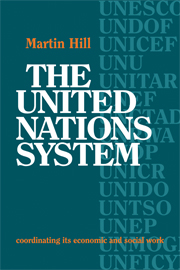Book contents
- Frontmatter
- Contents
- Foreword
- Preface
- Introduction
- Part I The problem of coordination and its setting
- 1 Relationship problems inherent in the decentralized United Nations System
- 2 Developments that have affected inter-agency relationships and coordination
- 3 The content of coordination activities
- 4 Intergovernmental organs responsible for coordination
- 5 The Administrative Committee on Coordination
- 6 The Secretary-General and the secretariats of the United Nations and the agencies
- 7 Some current constraints on order and coordination in the system
- Part II Some conclusions and suggestions
- Postscript
- 1 Abbreviations and glossary of institutions
- 2 Principal organs of the United Nations (General Assembly, Economic and Social Council and Secretariat) with main subsidiary organs directly concerned with economic and social cooperation and coordination (Status as of Spring 1976)
- 3 Chart of agencies related to the United Nations
- 4 Regional and branch offices of organizations of the United Nations System
- 5 Chart of the United Nations System
- 6 A new UN structure for global economic cooperation–list of conclusions and recommendations of the Group of Experts, prepared by the Secretariat
- Notes
- Index
7 - Some current constraints on order and coordination in the system
Published online by Cambridge University Press: 05 November 2011
- Frontmatter
- Contents
- Foreword
- Preface
- Introduction
- Part I The problem of coordination and its setting
- 1 Relationship problems inherent in the decentralized United Nations System
- 2 Developments that have affected inter-agency relationships and coordination
- 3 The content of coordination activities
- 4 Intergovernmental organs responsible for coordination
- 5 The Administrative Committee on Coordination
- 6 The Secretary-General and the secretariats of the United Nations and the agencies
- 7 Some current constraints on order and coordination in the system
- Part II Some conclusions and suggestions
- Postscript
- 1 Abbreviations and glossary of institutions
- 2 Principal organs of the United Nations (General Assembly, Economic and Social Council and Secretariat) with main subsidiary organs directly concerned with economic and social cooperation and coordination (Status as of Spring 1976)
- 3 Chart of agencies related to the United Nations
- 4 Regional and branch offices of organizations of the United Nations System
- 5 Chart of the United Nations System
- 6 A new UN structure for global economic cooperation–list of conclusions and recommendations of the Group of Experts, prepared by the Secretariat
- Notes
- Index
Summary
The last four chapters have been concerned with the problem of coordination envisaged in the United Nations Charter, the sort of issues that have been faced, and the approaches and instrumentalities used to meet them. But coordination, at least in the rather narrow sense in which it is usually understood, is no guarantee of order and coherence, let alone of efficiency. It often represents an attempt to make the best of a structure or set of relationships between organs which defies logic and good sense. On the other hand, one must be cautious about generalizations for an arrangement militating against order and coherence in the system may sometimes be justified by the dynamism it imparts.
One factor which has recently become disturbing is related to the United Nations Development Programme, which has to make long–term (generally five-year) commitments on the basis of uncertain voluntary contributions, voted, for the most part, year by year. This fundamental weakness in the Programme (a weakness from which UNICEF and other voluntary programmes also suffer in different degrees) was for many years of little practical significance, since total contributions were rising rapidly and steadily. It has, however, lately become a major cause of concern, the growth in contributions in 1975-1976 failing to match the growth in costs. Much has already been said about the effect of the proliferation of intergovernmental and expert organs, many with overlapping competences, which complicates the task of coordination and impedes progress because Governments are not equipped to deal properly with so much at the same time.
- Type
- Chapter
- Information
- The United Nations SystemCoordinating its Economic and Social Work, pp. 90 - 96Publisher: Cambridge University PressPrint publication year: 1978



